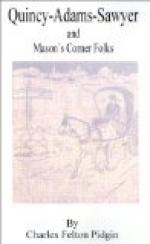As Deacon Mason regained the platform loud cries of “Vote! Vote! Vote!” came from all parts of the hall.
Tellers were appointed, and in a few moments the result of the vote was announced. In favor of Mr. Strout’s motion to accept the check, eighty-five. Opposed, two hundred and eighty. And it was not a vote.
“We will now proceed,” said the Moderator, as he resumed the chair, “to consider the question of appropriating money for the support of the Poor-farm.”
The next matter on the warrant of general interest was the appropriation of a small sum of money to purchase some reference books for the town library, which consisted of but a few hundred volumes stowed away in a badly-lighted and poorly-ventilated room on the upper floor of the Town Hall.
This question brought to his feet Zachariah Butterfield, who was looked upon as the watchdog of the town treasury. He had not supported Strout on the question of accepting the check, because he knew the position taken by the Moderator was legally correct, and he was very careful in opposing appropriations to attack only those where, as it seemed to him, he had a good show of carrying his point. He had been successful so often, that with him success was a duty, for he had a reputation to maintain.
“Mister Moderator,” he said, “I’m agin appropriatin’ any more money for this ’ere town lib’ry. We hev got plenty of schoolbooks in our schools; we hev got plenty of books and newspapers in our houses, and it’s my opinion thet those people who spend their time crawlin’ up three flights er stairs and readin’ those books had better be tillin’ ther soil, poundin’ on ther anvil, or catchin fish. Neow, I wuz talkin’ with Miss Burpee, the librari’n, and she sez they want a new Wooster’s Dictshuneery, ’cause ther old one iz all worn eout. Neow, I looked through the old one, and I couldn’t see but what it’s jest as good as ever; there may be a few pages missin’, but what’s thet amount ter when there’s more’n a couple of thousan’ on ’em left?”
Mr. Tobias Smith was again fidgeting in his seat. He evidently had something to say and was anxious to say it.
Mr. Butterfield continued: “Neow, to settle this question onct fer all, I make ther motion that this ’ere lib’ry be closed up and the librari’n discharged; she gits a dollar a week, and ther town ken use that fifty-two dollars a year, in my opinion, to better advantege.”
“Mister Moderator,” came again from Mr. Tobias Smith, “I rise to a question of privilege—”




